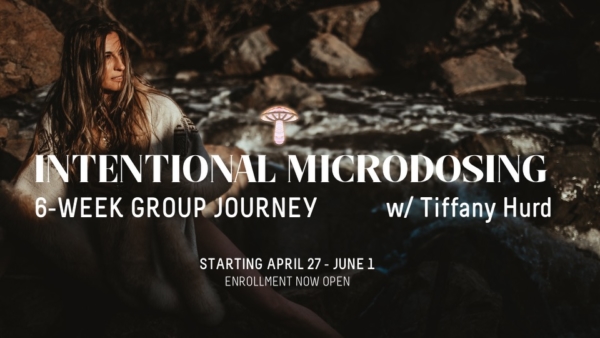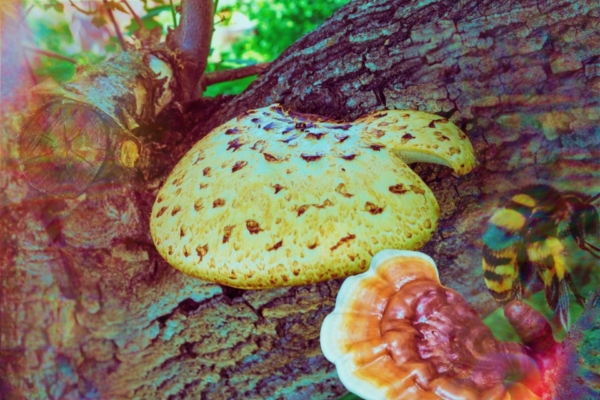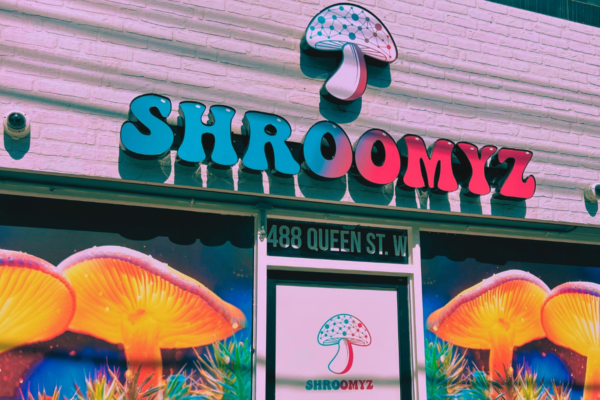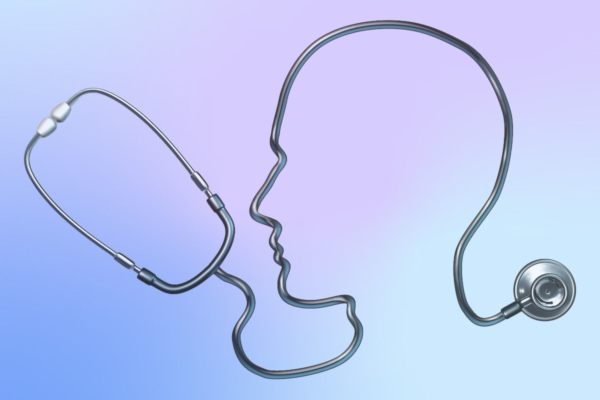
Psychedelics and Trauma
As a society, when we think of trauma, we typically refer to it as a significant event that has emotionally or physically impacted us. When trauma occurs, it stems from an unconscious place through the autonomic nervous system (fight, flight, freeze, fawn). All trauma deserves the same amount of attention, care, and respect. However, trauma occurs when we experience a lack of choice, feel unable to escape from something that overwhelms our nervous system, and experience a lack of safety that impairs our ability to cope and respond. This influences our ability to be present and leads to disconnection from ourselves and others.
When we lack the tools and resources to deal with traumatic events, the energy gets trapped in our body’s nervous system and affects us on a mental, physical, and emotional level. Over time, unprocessed trauma can lead to “dis-ease” in the body and presents as symptoms such as depression, anxiety, chronic illness, stress, OCD, and more.
The use of psychedelics can play a significant role in supporting the processing and healing of trauma by regulating the nervous system simultaneously. Depending on how trauma affects you, you may be aware or unaware of it. Fear may be associated with delving deeper into your trauma, and you may resist accessing it. Alternatively, you may repeat the same patterns without realizing that trauma is connected to it. The trauma may be deeply stored in your subconscious, making it seem out of reach.
Psychedelics can create an opening and an invitation to explore these parts of yourself. When you begin processing trauma, it can present as a variety of emotions that may be unsettling or confusing. The nervous system helps all parts of your body communicate with each other, and regulating it can not only ease your response but also support your processing by keeping you in a grounded parasympathetic state. In this state, your body can receive more rather than being in a sympathetic state, which is connected to stress, anxiety, and a lack of safety.
Healing Trauma with Psychedelics

In my approach, I recognize that trauma, old patterns, and habitual beliefs can be deeply ingrained in the body, even when the mind has forgotten. Plant medicines and psychedelics offer a unique opportunity to explore these deeper aspects of the psyche and body, helping you uncover what may be holding you back from inner freedom and expansion.
Six years ago, my personal journey with psychedelics began when I made the transition from using them recreationally to using them with intention. I grew up in a single-parent household that was unstable, and drugs were frequently sold in our home. As a result, my childhood was filled with significant challenges, including periods of homelessness, living in shelters, and with family friends. My father was in and out of prison and passed away when I was only eleven years old. Despite these difficulties, I was able to follow my passion for basketball and earned a Division I full-ride scholarship to Providence College.
After college, I moved to Chicago and spent over twelve years working for Fortune 500 companies in the medical industry. Although I was in executive positions and learned a great deal about neurology, neuroscience, and neurovascular, I remained unfulfilled in my career. I also struggled with depression, anxiety, and relied on SSRI medications for over seven years. I turned to personal development and therapy for years, but I knew I needed to process deeper emotions that talking alone couldn’t reach, and that’s where psychedelics came into my life.
Psychedelics and plant medicines found me at a turning point in my life. I began microdosing with the goal of getting off of my medication and later sat in an ayahuasca ceremony. Taking ayahuasca required me to no longer be dependent on SRRIs, and I felt a strong call to this medicine. It all felt like a sign to wean off of the medication that I was so highly dependent on for so long. So, I began the transition from taking SSRI’s habitually to microdosing. Within three months of microdosing psilocybin, I was able to discontinue my medication and deepen my relationship with plant medicine. I sat in ceremonies for continued healing and personal growth.
My experiences with psychedelics have had a profound impact on my life, but they were not a shortcut to inner work. Instead, they have been an incredible ally, tool, and modality to support my process. Establishing healthy habits and learning to regulate my emotions through my body and mind allowed me to implement the awareness and clarity that psychedelics brought to me. Psychedelics showed me my trauma, and implementing mind-body somatic awareness tools allowed me to process it. Without integrating these techniques into my day-to-day life, the impact of psychedelic ceremonies would be limited. These tools can help you transform old ways of being that no longer serve you, and enable you to embody a more desirable state of being.
Microdosing for Trauma

My foray into the world of plant medicines and psychedelics began with microdosing. I was at a place in my life where I was repeating the same patterns in close relationships, leaving an unfulfilled corporate career in the medical industry for another, and taking medications to avoid accessing the deepest parts of pain that lived in my body. Microdosing gracefully opened me to exploring these uncomfortable parts of myself, and it was exactly what I needed to slowly remove the layers that I was gripping so tightly to. This created a lot of internal pain and suffering, which manifested as depression, anxiety, and lack of fulfillment.
I started with microdosing psilocybin because it offered me similar effects that a high ceremonial dose of psychedelics can offer, but at a lower dosage and over a longer period of time. This was incredibly helpful because I eased into my experience at a slower pace, which gave my nervous system the time, space, and energy to process things. Through microdosing, I was able to completely stop taking my SSRI medication in just three months. Although my emotions increased as I was tapering off of my medication, I found modalities that positively impacted my journey and mastered how to work with this special medicine to heal a lot of my trauma on a subtle level.
Growing up in a broken home, living in shelters, doing drugs at a young age, and experiencing sexual abuse all created barriers around the way I viewed and lived my life. I carried deep beliefs around unworthiness, confusion on how to give and receive love in a healthy way. I also struggled with the confidence to choose a career and relationships that truly inspired me to be better. I intuitively knew microdosing just scratched the surface for me, yet the medicine met me exactly where I was and offered me what I needed.
I then took my journey deeper by sitting in both psilocybin and ayahuasca ceremonies. This is where sitting in ceremony shined. I felt connected to microdosing with psilocybin, and this created the safety to go deeper. Through these experiences, I was able to get out of my own way and receive the clarity, awareness, and healing to move forward with my life.
The Science of Psychedelics and Trauma
Psychedelics have been shown to be effective in supporting mental health and the treatment of trauma. For example, depression, anxiety, and OCD often involve rigid thought patterns, where a person is convinced that their internal experience is a certain way, or that a specific traumatic event happened in a particular way.
Psychedelics can help treat trauma by activating the 5HT2A receptor site in the brain and increasing flexibility in our thinking and bodily responses. This enhanced flexibility allows us to form new connections that serve us better, and introduce cognitive flexibility within the brain, leading to a shift in perceptions and opening up new neural pathways. This shift becomes useful because many of our old beliefs and habits can be the root cause of our mental health issues, such as depression, anxiety, addiction, stress, and lack of creativity.
In other words, psychedelics allow the brain to sprout new neurons and create new neural pathways, which gives us more options to create healthier habits. By breaking out of old thought patterns and opening up new possibilities, we’re no longer limited to a single way of thinking.
Psychedelics and the Brain
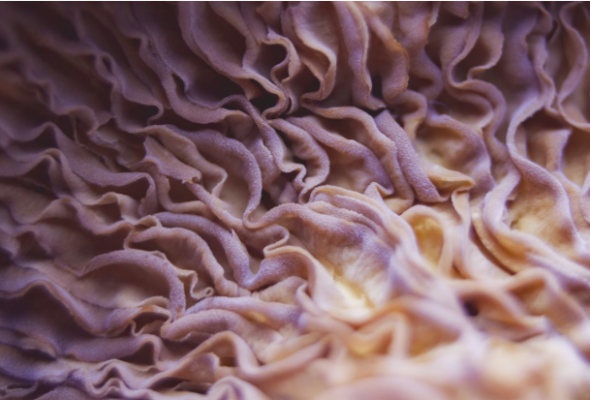
We each have what is referred to as our “Default Mode Network,” which is a network of regions in the brain that becomes very active when we are thinking about the past, the future, or when our thoughts are ruminating, over-analyzing, and constantly wandering.
When we work with psychedelics, the connectivity between regions of the brain that are typically not in communication comes into effect and begins talking with each other. In other words, the “DMN” that is typically very active is drastically reduced and is no longer as active. Therefore, more spaciousness is available for other thoughts and perspectives to come in from a much more grounded and relaxed state, rather than from an overactive/overprocessing place.
Psychedelics are also known to signal the 5HT2A receptors in our brain, which play a similar role as serotonin, a chemical messenger that supports nerve cells’ communication with other cells within the body. Similar to SSRI’s role in enhancing your serotonin, psychedelics also act on your serotonin pathways within your brain. Serotonin plays a really important role in our bodies as it is associated with our mood, cognition, memory, eating, and even hormones.
The amygdala part of our brain is known for the fear response. Psychedelics can dampen that fear response, so all of a sudden, this reactivity that we once perceived as challenging is no longer present. So, we can then move forward and heal from it rather than being held back from it.
Psychedelics are known to fight inflammation in the body. This can neurologically soothe anti-inflammatory within your nervous system. When we experience inflammation, it’s typically our body’s response to protecting us from infection, but when there is no real (fear) danger, this can cause a variety of different symptoms such as mental health conditions or autoimmune diseases.
Psychedelics increase your neuroplasticity and neurogenesis, which is your brain’s ability to learn, unlearn, and relearn belief patterns and conditioned habits. These are typically the root cause of anxiety, depression, stress, lack of motivation, and so on. So, in other words, psychedelics offer your brain the ability to sprout new neurons and create new neural pathways.
Risks and benefits of using psychedelics for trauma
Psychedelics can amplify what’s already present in your body, which means that suppressed trauma may be activated. That’s why it’s crucial to work with a guide or facilitator whom you trust and to ensure that you’re in a safe, grounding, and supportive environment to prevent retraumatization. There are potential risks and contraindications to using psychedelics to treat trauma, so it’s essential to seek guidance and support if you experience paranoia/suspicion, have a family history of psychosis, have a history of schizophrenia and/or seizures, take certain SSRI medications, or are deficient in vitamins, particularly minerals/magnesium.
The benefits of using psychedelics to treat trauma are most apparent when you prepare and integrate your experiences correctly. This requires intentional preparation that includes trauma and mental health history screening, discussing your intentions/goals for the ceremony, clearly defining the importance of set & setting (your mindset going into the experience along with the environment in which you’ll be), and addressing any concerns or questions. This creates safety, structure, and trust between you and your guide.
During ceremony and even microdosing, having trauma-informed tools to process emotions is invaluable. In ceremony, you may experience wisdom, awareness, and new insights, but integration is how you embody them through the body. You have the opportunity to integrate these changes within your nervous system and anchor them in, so it’s essential to take the time to do so. Many people have powerful ceremonies but fail to anchor those changes within their nervous system, and they revert to their default patterns after the ceremony.
The healing begins after the ceremony through integration. This means integrating back into your environment with care and implementing a plan for how you’ll implement the changes you desire in your life. The ceremony is only 10% of the journey, while the integration stage is 90%. You may require an implementation of a therapeutic mental health plan, care, and treatment with a psychedelic-experienced coach or guide.
There’s a unique way of microdosing to ensure you receive the most of your time and after guiding hundreds of clients, I’ve created an intentional framework on how to achieve this. To learn more, you can sign up for the microdosing online program here.
Microdosing Online Program
The Future of Psychedelics for Trauma

The future of psychedelics and its potential treatment to transform mental health treatment and overall wellbeing is promising. Previous studies by Johns Hopkins Medicine “researchers showed that psychedelic treatment with psilocybin relieved major depressive disorder symptoms in adults for up to a month. Now, in a follow-up study of those participants, the researchers report that the substantial antidepressant effects of psilocybin-assisted therapy, given with supportive psychotherapy, may last at least a year for some patients.”
The New York Times specifically shared: “Research into the mental health benefits of full doses of psychedelics is promising, and one early-phase study even found that psilocybin, at high doses, may be as effective as a selective serotonin-reuptake inhibitor for treating depression. Full doses of psychedelics help the brain develop new cellular connections, a process called neuroplasticity, and there’s some evidence that microdoses produce similar changes.”
Conclusion
Healing from trauma can be a long and challenging journey, and traditional methods of therapy and medication may not always be enough to fully address the deeply ingrained patterns and beliefs that hold us back. However, there’s growing evidence that psychedelics may offer a unique opportunity to explore and heal the subconscious parts of our psyche and body that traditional methods may not be able to.The use of psychedelics can create an opening and an invitation to explore these hidden parts of ourselves, which can be unsettling or confusing but also transformative. And while psychedelics aren’t a magic bullet, they can be an incredibly powerful tool in the hands of someone who’s committed to their own healing and growth. So if you’re ready to dive deep and explore what may be holding you back from inner freedom and expansion, psychedelics may be worth considering as part of your journey.
—————————————————————–
Tiffany currently has open enrollment for an online 6-week group microdosing program. For the next 72-hours only you can purchase the program with a $500 discount here! After 72-hours, the program will increase to its full price.
Looking to learn more about Tiffany’s work? Connect with her here:
Socials:
